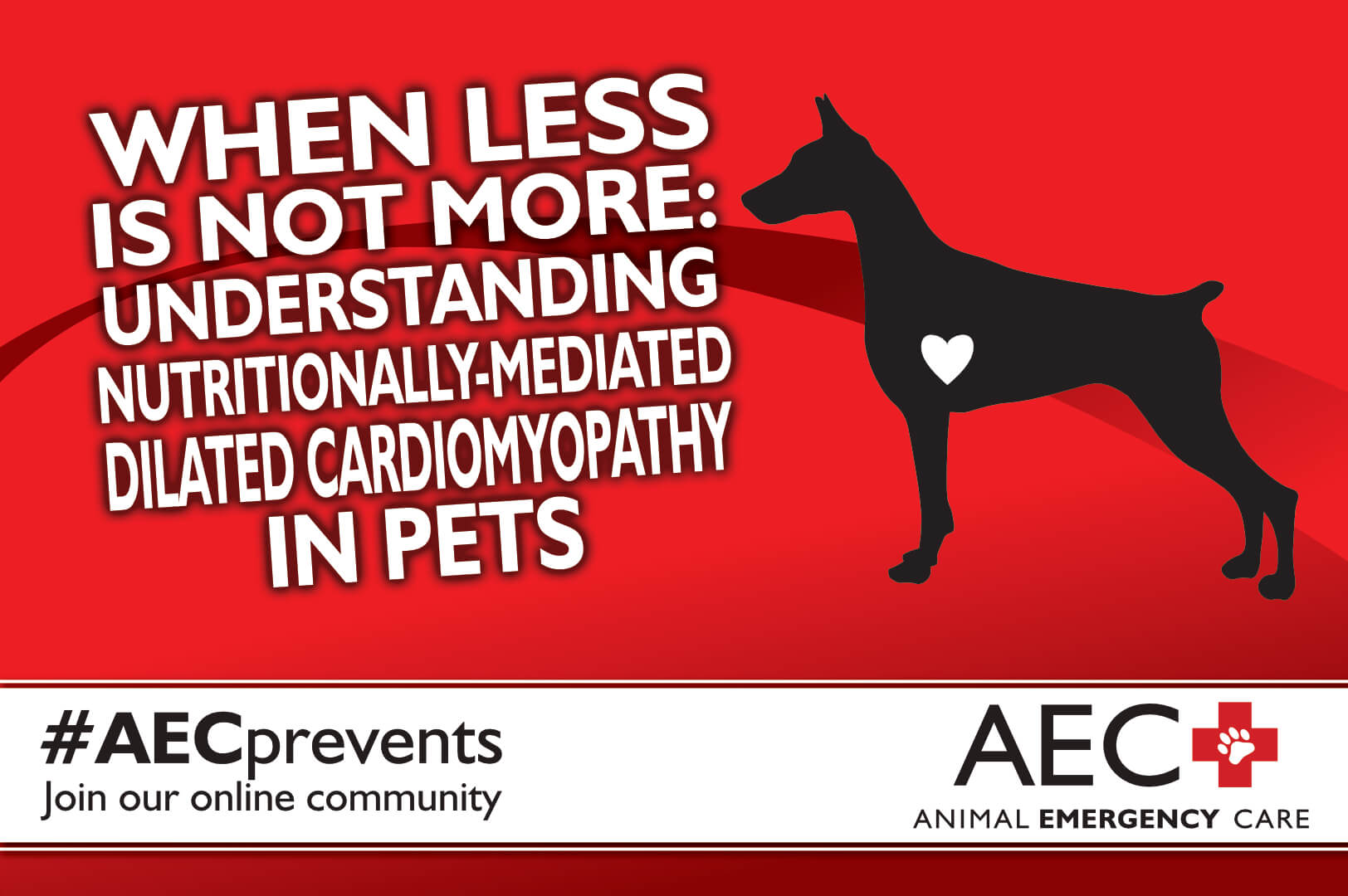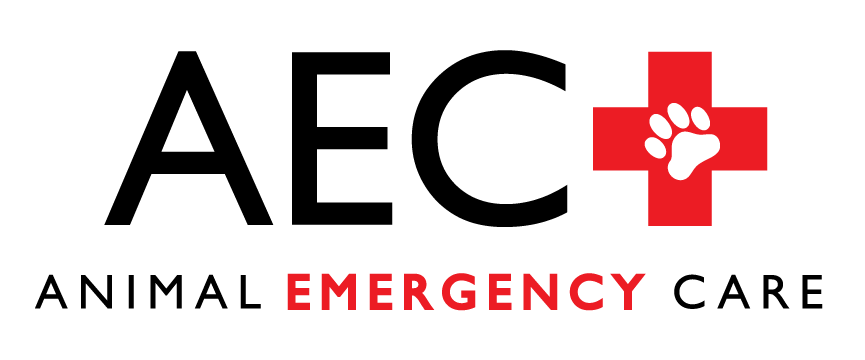Our pets are family and regular veterinary checkups, exercise, and preventive care are critical to ensure they remain healthy through all life stages. Proper nutrition is also a vital component of your pet’s organ function and overall health and pet owners have a wide variety of choices when it comes to deciding what to feed their pets. Food choices include the popular grain-free and limited-ingredient diets. However, recent research has shown these diets can be dangerous for pets and cause dilated cardiomyopathy (DCM) which can be fatal. Our Animal Emergency Care team wants to ensure your pets are properly nourished and disease-free, so we describe nutritionally-mediated DCM signs, treatment, and prevention in pets.
What is nutritionally-mediated dilated cardiomyopathy in pets?
Your pet’s heart functions like a well-oiled machine keeping the blood flowing and carrying oxygen to vital organs. DCM is a heart condition in pets that is caused by a heart muscle disorder, and results in an enlarged heart, weakened contractions, decreased pumping ability, and leaky heart valves. DCM can occur in any dog or cat breed. However large breed dogs—including boxers, Great Danes, Doberman pinschers, and King Charles spaniels—have an increased risk because of a genetic predisposition. Previously, DCM was commonly diagnosed in cats who did not receive a balanced diet because cats lack the ability to produce taurine, an essential amino acid that is important for proper heart function. Now a recent study has shown compelling evidence that limited-ingredient boutique, exotic, and grain-free (BEG) diets, including grain-free, legume-based, chickpea-based and raw diet pet foods, have led to an increase of DCM in dogs. Pets who develop nutritionally-mediated DCM are at risk for congestive heart failure, which can be fatal.
Nutritionally-mediated dilated cardiomyopathy signs in pets
Signs vary and may not be immediately obvious during the early stages of the disease. Some pets also may succumb to nutritionally-mediated DCM without any signs, so regular examinations by your family veterinarian are key for early diagnosis. Disruptions to your pet’s heart muscle and flow pattern may reveal an audible murmur which can be heard during a veterinary examination. Signs may include:
- Increased heart rate
- Exercise intolerance
- Lethargy or weakness
- Coughing or gagging
- Difficulty breathing
- Increased panting
- Decreased appetite
- Weight loss
- Fainting or collapsing episodes
- Abdominal distension
- Pale or blue gums
Nutritionally-mediated dilated cardiomyopathy diagnosis and treatment in pets
Bring your pet in for immediate veterinary care if they have DCM signs and tell your veterinarian if your pet has been eating a BEG diet. Your veterinarian will use a stethoscope to evaluate your pet’s heart rhythm and rate as well as listen to their lungs. Pets with nutritionally-mediated DCM have an increased risk for congestive heart failure which can cause muffled lung sounds because fluid is present. Diagnostic tests may include:
- Blood tests —Various blood tests may be recommended to evaluate your pet’s overall organ function, electrolyte levels, presence of infection, cardiac protein levels, or nutritional deficiencies.
- Blood pressure —Pets with DCM may have elevated blood pressure.
- Electrocardiogram (EKG) — Problems with electrical activity in your pet’s heart can be detected with an EKG. Some pets may require a Holter monitor to review an EKG over a 24 hour-period.
- X-rays — Pictures of your pet’s heart will provide an overall view of their chest cavity and allow your veterinarian to evaluate the heart and lungs, and detect abnormal fluid accumulation.
- Echocardiogram —Anultrasound exam provides a real-time visualization of the entire heart to assess overall function and blood flow.
Pets with nutritionally-mediated DCM have a guarded prognosis and early detection is key to ensure a more positive outcome. DCM has no cure but several treatments are available to slow the disease progression and help your pet remain comfortable. Treatment will depend on the severity of the disease. Pets with congestive heart failure may require hospitalization for stabilization and treatment, which may include:
- Oxygen therapy
- Intravenous diuretics to decrease fluid in the chest
- Pimobendan to improve heart strength and lower blood pressure
- Vasodilators to improve circulation
- Beta blockers to decrease blood pressure
- Bronchodilators to increase breathing ability
- Antiarrhythmic medications, to regulate heart rhythm
- Specialized diet
Financial options for your pet’s nutritionally-mediated dilated cardiomyopathy
Pets undergoing nutritionally-mediated DCM treatment may require an extended hospital stay, several checkups, and lifelong medical management which can result in a large veterinary bill. However, pet health insurance—like Trupanion—will ensure you can cover the costs for your pet’s veterinary care. Trupanion can pay your veterinary clinic directly which eliminates the need to submit paperwork and wait for reimbursements. Other alternative payment options include:
- Care Credit
- Scratch Pay
- Pet health savings accounts
- Short-term loans
Nutritionally-mediated dilated cardiomyopathy prevention in pets
Feeding your pet a complete and balanced diet approved by the Association of the American Feed Control Officials (AAFCO) is the best way to prevent nutritionally-mediated DCM. AAFCO-approved foods contain all of the required nutrients needed to maintain your pet’s heart and overall organ health. Always consult your family veterinarian before changing your pet’s diet to ensure they are receiving required nutrients.
Call your family veterinarian if your pet has been eating a BEG diet, or, if your pet has DCM signs. If it is after hours, call Animal Emergency Care for emergent help. #AECprevents
Sources:
https://ccah.vetmed.ucdavis.edu/areas-study/genetics/nutritionally-mediated-dcm


